ESD experts discuss education and SDGs

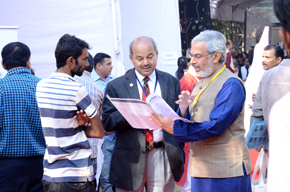

Over 750 participants from 22 countries shared their thoughts on the role of education in realizing the UN’s Sustainable Development Goals, at the international conference ‘Education as a Driver for Sustainable Development Goals’, which began on 11th January, 2016, on the CEE premises.
Organized by CEE, in partnership with UNESCO, UNEP and the Government of India, the three-day Conference brought together global experience and expertise to highlight and strengthen the role of education in realizing the Sustainable Development Goals (SDGs). Over 750 participants, including senior officials from the Ministry of Environment, Forest and Climate Change (MoEF&CC), international ESD experts, environmentalists, academicians, researchers and students, took part in the Conference, which built upon and recognized education as a key enabler in achieving the SDGs.
The Conference was inaugurated by Shri O. P. Kohli, Honourable Governorshri of Gujarat, in thepresence of Alexander Leicht, Chief, Section of Education for Sustainable Development, UNESCO, Mahesh Pradhan, Chief, Environmental Education and Training Unit, Division of Environmental Policy Implementation, UNEP, Shri Susheel Kumar, Special Secretary, Ministry of Environment, Forest and Climate Change, Government of India, Dr. Ashok Khosla, Chairman, CEE Governing Council, and Kartikeya V. Sarabhai, Director, CEE. Video messages from Ibrahim Thiaw, UNEP Deputy Executive Director and Assistant Secretary- General of the United Nations, and Irina Bokova, Director-General of UNESCO, were also aired during the inauguration.
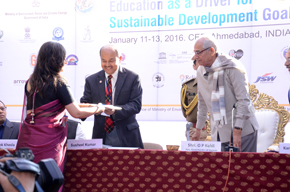
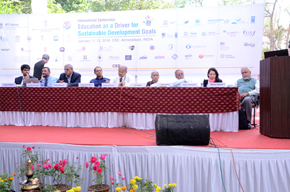
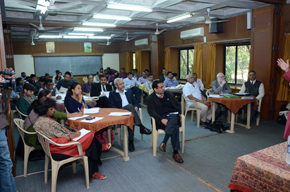 As part of the pre-conference events, workshops and partnerships’ meet were conducted on 10th January, 2016. A national workshop on “Achieving Sustainable Development Goals- Opportunities and Challenges for India” was organised by CEE in partnership with Niti Aayog. The workshop focused on measurement, indicators and tracking progress of SDGs and the role of States in achieving SDGs. The ‘GUPES Partnerships Forum 2016: Higher Education for SustainableDevelopment Goals (SGDs)’ meeting witnessed discussions over the contribution of higher education in the implementation of the SDGs and provided inputs to the Conference in the light of the education-related SDG targets. On the same day, a third session on ‘OER Integration in e-Learning Materials on Research Methodology in Education’ for teachers, teacher trainers and material developers was also coordinated by Prof. Mohandas B. Menon and Prof. B. Phalachandra, Wawasan Open University, Malaysia
As part of the pre-conference events, workshops and partnerships’ meet were conducted on 10th January, 2016. A national workshop on “Achieving Sustainable Development Goals- Opportunities and Challenges for India” was organised by CEE in partnership with Niti Aayog. The workshop focused on measurement, indicators and tracking progress of SDGs and the role of States in achieving SDGs. The ‘GUPES Partnerships Forum 2016: Higher Education for SustainableDevelopment Goals (SGDs)’ meeting witnessed discussions over the contribution of higher education in the implementation of the SDGs and provided inputs to the Conference in the light of the education-related SDG targets. On the same day, a third session on ‘OER Integration in e-Learning Materials on Research Methodology in Education’ for teachers, teacher trainers and material developers was also coordinated by Prof. Mohandas B. Menon and Prof. B. Phalachandra, Wawasan Open University, Malaysia
Spread over three days, the conference had working group themes broadly corresponding to the Sustainable Development Goals (SDGs), and highlighted the role of education in achieving the targets for a sustainable planet. Spread over three days, the conference had working group themes broadly corresponding to the Sustainable Development Goals (SDGs), and highlighting the role of education in achieving the targets for a sustainable planet. The 17 working groups were organised on the lines of Sustainable Development Goals (SDGs), on themes such as poverty alleviation, sustainability education for achieving food security and promoting sustainable agriculture, ensuring continuum of quality care for healthy lives and well-being, quality education, gender equality and empowerment, sustainable management of water and sanitation, access to sustainable and modern energy, sustainable economic growth, sustainable industrialization and infrastructure, sustainable cities and human settlements, conservation and sustainable use of marine and terrestrial ecosystem and resources, justice and peace, and partnerships for implementation.
Over the course of three days, each working group met for nine hours in total to assess the role of education (formal, non-formal and informal learning settings) in addressing the issue/SDG through sharing of case examples, identified ideas/projects/initiatives to be scaled up, discussed knowledge, skills, attitudes, values and competencies relevant to addressing the issue/SDG and developed a draft competency framework on the respective SDG, and developed recommendations to make education systems more responsive to addressing SDGs.
The Conference attempted to apply the learnings of the UN Decade of Education for Sustainable Development to develop programmes to achieve the SDGs, to look at how the Global Action Programme (GAP) on ESD can play a major role in the SDG strategy, to develop synergies and partnerships, to develop a common understanding of competencies to address SDGs established to advance policy and practice on education for SDGs, and to build synergies and partnerships to enhance the role and scope of education to address SDGs.
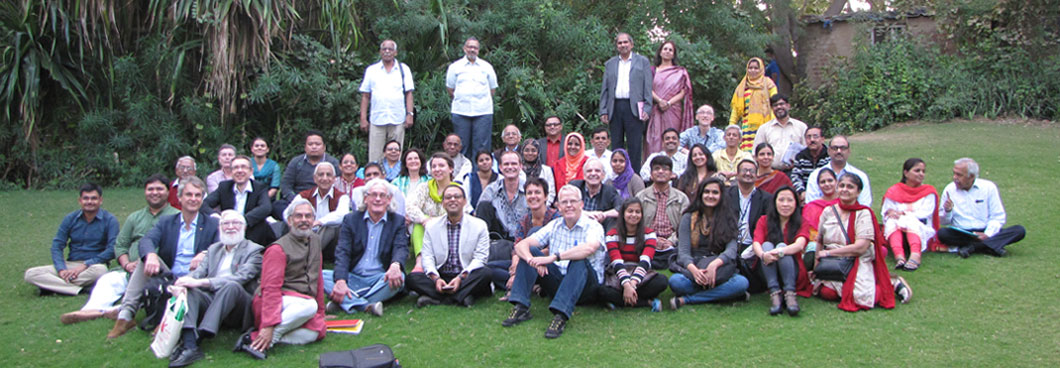 |
 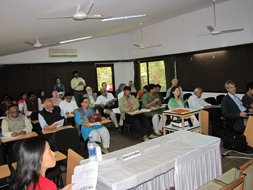  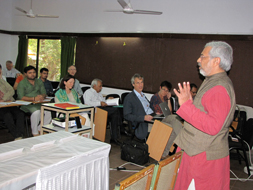 |
| The ‘GUPES Partnerships Forum 2016: Higher Education for Sustainable Development Goals (ESDGs)’ meeting witnessed discussions over the contribution ofhigher education in the implementation of the SDGs and provided inputs to the Conference in the light of the education-related SDG targets. The GUPES Forum also highlighted the need for a national level University network in India focusing on sustainability education. |

